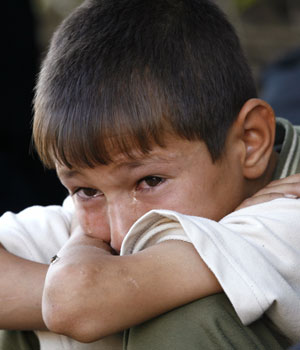
An Iraqi boy cries as he waits outside Baghdad’s al-Yarmouk hospital June 1, 2006. Two of his brothers were shot by unknown gunmen – killing one and seriously wounding the second (REUTERS)
BAGHDAD, (Reuters) – The Iraqi government will ask the United States for the files of an investigation into allegations that U.S. Marines killed Iraqi civilians in Haditha last year, Prime Minister Nuri al-Maliki said on Friday.
Standing beside U.S. Ambassador Zalmay Khalilzad during a visit to a new Baghdad power plant, Maliki said he first heard of the alleged Nov. 19 massacre in the town through the media.
“I hope it (the U.S. investigation) will be fair for the sake of all the victims,” said the Shi’ite Islamist whose government of national unity was sworn in 13 days ago.
Asked if he would demand the files, Maliki told reporters without elaborating: “Yes”.
U.S. defence officials have said murder charges may be brought against Marines following an investigation into the deaths of 24 civilians in Haditha, which some commentators are comparing to the 1968 My Lai massacre in Vietnam.
Maliki, who has said he is losing patience with reports of killings of Iraqi civilians, condemned the suspected massacre in Haditha as a “terrible crime” on Thursday.
The U.S. military says it is investigating four other cases in which U.S. troops are alleged to have killed Iraqi civilians.
In one of those probes, U.S. military prosecutors were expected to charge seven Marines and a Navy corpsman in the death of an Iraqi civilian, said defence lawyer David Brahms, who represents two of the Americans said late on Thursday.
The eight men are being held in the brig at Camp Pendleton, California, in connection with the April 26 killing of a Hamandiya man and a subsequent attempt to make him look like an insurgent by placing an AK-47 rifle near his body.
Asked if the United States would hand over the Haditha files, Khalilzad said a meeting about Haditha would be held with the top U.S. commander in Iraq, General George Casey.
U.S. House Speaker Dennis Hastert said in a news conference with Maliki: “We are concerned that wrong was done. And if in fact evidence shows there was wrong done people will be punished and America will offer its deepest apologies.”
Hastert, a Republican, is heading a visiting delegation.
Khalilzad said an investigation was still being conducted into a shooting involving U.S. troops in Ishaqi, north of Baghdad, in March.
Police have said six adults and five children were shot dead in a U.S. raid on a home there. The military said two women and a child died during the arrest of an al Qaeda militant. A senior Iraqi police officer said autopsies showed each had been shot in the head.
Television footage showed the bodies in the Tikrit morgue — five children, two men and four women. Their wounds were not clear, though one infant had a gaping head wound.
Describing that day, Ibrahim Khalaf told Reuters on Friday that U.S. troops attacked his brother Faez’s house before raiding his own home. Death certificates from the hospital where the victims were taken said they died of gunshot wounds.
“They started shooting in the air before entering the house. This process lasted for about 20 minutes and after that they entered the house and started shooting inside it,” he told Reuters Television.
“After that, they raided my house, binding my hands and blindfolding me. They gathered my family members in one room. One of the soldiers told them (his colleagues) to kill them (my family) all. But thank God they did not.
“We went to my brother’s house. The residents of the village dragged the bodies from the rubble.”
Maliki, who has moved quickly to assert his authority since becoming prime minister, suggested on Friday that he was prepared to launch an offensive against al Qaeda militants and other insurgents in the western city of Ramadi if necessary. “We are trying to reach reconciliation with the people of Ramadi. But if all other measures fail we will use force.”

A father carries his injured son to al-Kindi hospital, after two bombs struck in quick succession at a pet market in central Baghdad, killing at least five people and wounding 57 in Iraq, June 2, 2006 (AP)

Iraqi Prime Minister Nouri al-Maliki gestures during a press conference in Baghdad, Iraq, June 1, 2006 (AP)
